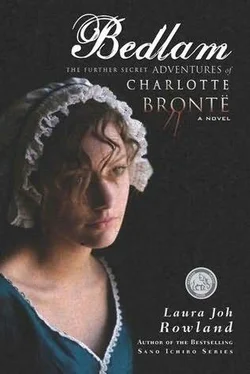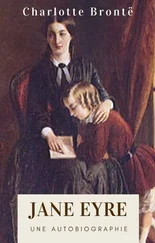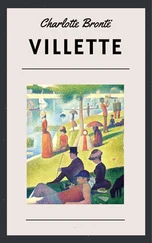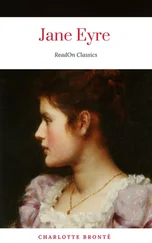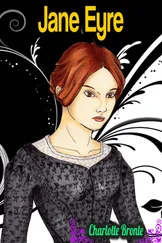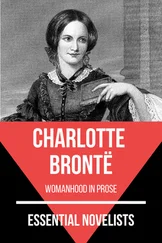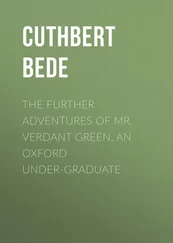Laura Rowland - Bedlam - The Further Secret Adventures of Charlotte Bronte
Здесь есть возможность читать онлайн «Laura Rowland - Bedlam - The Further Secret Adventures of Charlotte Bronte» весь текст электронной книги совершенно бесплатно (целиком полную версию без сокращений). В некоторых случаях можно слушать аудио, скачать через торрент в формате fb2 и присутствует краткое содержание. Жанр: Исторический детектив, на английском языке. Описание произведения, (предисловие) а так же отзывы посетителей доступны на портале библиотеки ЛибКат.
- Название:Bedlam: The Further Secret Adventures of Charlotte Bronte
- Автор:
- Жанр:
- Год:неизвестен
- ISBN:нет данных
- Рейтинг книги:5 / 5. Голосов: 1
-
Избранное:Добавить в избранное
- Отзывы:
-
Ваша оценка:
- 100
- 1
- 2
- 3
- 4
- 5
Bedlam: The Further Secret Adventures of Charlotte Bronte: краткое содержание, описание и аннотация
Предлагаем к чтению аннотацию, описание, краткое содержание или предисловие (зависит от того, что написал сам автор книги «Bedlam: The Further Secret Adventures of Charlotte Bronte»). Если вы не нашли необходимую информацию о книге — напишите в комментариях, мы постараемся отыскать её.
Bedlam: The Further Secret Adventures of Charlotte Bronte — читать онлайн бесплатно полную книгу (весь текст) целиком
Ниже представлен текст книги, разбитый по страницам. Система сохранения места последней прочитанной страницы, позволяет с удобством читать онлайн бесплатно книгу «Bedlam: The Further Secret Adventures of Charlotte Bronte», без необходимости каждый раз заново искать на чём Вы остановились. Поставьте закладку, и сможете в любой момент перейти на страницу, на которой закончили чтение.
Интервал:
Закладка:
“The small, plain one.”
“None of your business, I’m sure.” Offended by his impertinence, she was haughty as well as frightened.
He took a sovereign from his pocket and offered it to her. Her eyes bulged with greed. She accepted the coin. “The lady’s Charlotte Bronte, also known as Currer Bell. The famous authoress.”
“Does she reside in the house?”
“No. She’s just visiting.”
“Where does she reside?”
“Haworth. In Yorkshire.” The maid slid a nervous glance toward the house. “I can’t talk anymore. The mistress doesn’t like us to gossip.” She hurried away.
The Prussian walked around the corner, to a waiting carriage. He climbed in and sat opposite the two men already inside. Their names were Friedrich and Wagner. They sat rigidly upright, foreign soldiers in British civilian garb. Friedrich was a fine specimen of strong manhood; Wagner his lanky, puffy-faced, distorted reflection.
“Did you find out what you wanted to know, sir?” Friedrich asked.
“Yes.” The Prussian relayed the intelligence gleaned from the maid.
Wagner said, “Sir, is this Charlotte Bronte a problem?”
“Obviously. She witnessed our operation in Bedlam. If she tells the police what she saw, they may investigate because she is a woman of position. And we do not want the police snooping in our business.”
Wagner frowned. “She could make trouble for us in Bedlam.”
“Also in more important spheres,” the Prussian said grimly. “She is acquainted with John Slade. Maybe they spoke before we got to him. Maybe he told her something.”
“What should we do, sir?” Friedrich asked.
“For now we’ll watch her,” the Prussian said. “If she appears to know too much-” He removed from his pocket a long, slender knife and slid it out of its leather sheath. The sharp blade reflected his pale eyes, which were devoid of mercy. “We follow standard procedure.”
As we rode through Hyde Park Gardens, Mr. Thackeray said, “Which play have you chosen for our enjoyment, Miss Bronte?”
“ The Wildwood Affair,” I said.
“I’ve not heard of that one,” Mrs. Brookfield said.
“At which theater is it playing?” Mrs. Crowe asked.
“The Royal Pavilion,” I said.
Mrs. Brookfield said, “Where, pray tell, is that?”
“In Whitechapel.” I could tell that neither Mrs. Brookfield nor Mrs. Crowe wanted to attend a play not endorsed by the critics, in a poor part of town. I confess that I was a little amused by their discomfiture. They turned entreatingly to Mr. Thackeray.
Mr. Thackeray said, “I told Miss Bronte that she could choose the play, and a man must keep his promises.”
The ladies conceded with good grace. They chatted politely with me until we reached Whitechapel. The bright Saturday afternoon bustle was gone. Harlots posed under the flickering gas lamps along the high street and called to passing men. Drunkards filled gin palaces, from which spilled rowdy laughter and discordant music. The crowds were still thick around the stalls, but new attractions had sprung up, like plants that only bloom at night. Curtained enclosures housed a freak show, whose signs advertised hairy men and hairless dogs, gorillas and giants, Aztecs and bearded women. Excitement and danger laced the foul, smoky air. The back streets were dark, fearsome tunnels.
It wasn’t hard to believe that a murderer had stabbed and mutilated his victims there.
Mrs. Brookfield murmured, “My heavens.” Mrs. Crowe’s huge eyes grew huger with fright. Even Mr. Thackeray looked uncertain. The carriage stopped outside the Royal Pavilion Theater. With its Grecian columns and dingy white plaster facade, it resembled a ruined classical temple. The people who poured in through the door hailed from the lower classes, the men in laborers’ clothes, the women in cheap finery. When we alit from the carriage, a crowd gathered to watch. We were ridiculously overdressed. Boys jeered and whistled at us. We walked toward the theater, surrounded by coarse, staring faces, jostled by the other patrons. Mr. Thackeray nodded, smiled, and bowed as if making an appearance at Buckingham Palace. Mrs. Brookfield and Mrs. Crowe cringed. I searched the crowd for Slade, but in vain.
At the ticket booth, Mr. Thackeray bought four seats in front boxes. Inside, the shabby auditorium was dimly lit by guttering lamps around the stage. Our shoes stuck to the floor as we walked down the aisle. Most of the seats were already filled. A roar of conversation and laughter resounded up to the galleries. The air smelled of gas, tobacco smoke, urine, and the crowd’s breath, which reeked of beer, onions, and bad teeth. People stared and pointed at us as we took our seats. We were the center of attention until the play started.
The first scene featured a miserly old man who owned a mill in a fictional town called Wildwood. Sporting a black mustache and hat, he cut the wages of his workers; he strutted, sneered, and counted piles of cash. He was a ludicrous caricature, whom the audience booed with great gusto. Mr. Thackeray chuckled tolerantly. Mrs. Brookfield and Mrs. Crowe looked bored.
When the mill owner called for his wife, an expectant hush settled over the audience. A young woman walked out onto the stage. She was as slim as a wraith, dressed in a white, diaphanous gown that clung to her full breasts. Black, curling hair streamed down her back. Her features were distinctly Slavic, her deep-set eyes aglow with passion. The portrait on the playbill had not done her beauty justice. All gazes were riveted on her. Whispers of “Katerina the Great” swept the audience. Someone murmured, “A Jewess from Russia.” I’d never seen her before, but I was so shocked by recognition that I uttered a cry I couldn’t stifle. For the second time since I’d arrived in London, the dead had been resurrected. Katerina the Great was my sister Emily.
She did not resemble Emily in physical appearance, but rather in spirit. She burned with the same inner fire. She looked as I imagine Emily would have, had she traveled to Heaven and Hell and returned.
Katerina spoke her first line: “Here I am, Husband.”
They were ordinary words, not the stuff of great playwriting, but Katerina imbued them with her vibrant spirit. Her deep voice, free of any foreign accent, filled the theater. Such power had Emily’s voice possessed. Emily rarely spoke, but when she did, one was compelled to listen. Now the audience listened, with all ears. We watched with fascination and horror as the mill owner made Katerina wait on him at dinner as if she were a slave. When she accidentally spilled the soup, he threw the bowl at her. Because the roast was overcooked, he slapped her face. Then he embraced her with cruel, wanton lust. Katerina endured her humiliation with the dignity of a saint. Alone at night, she sang a lament that would break the hardest heart. I could feel the audience’s sympathy toward her and its hatred of her husband. But my emotions were aroused for another reason.
Thus had Emily endured the trials of her life. She had been happy only at home, and the occasions she’d been compelled to leave Haworth had caused her much anguish. When she’d accompanied me to school in Belgium, when she’d ventured out into the world to assist me during the course of my adventures of 1848, she had displayed the same courage as Katerina did now. I could hardly bear to watch and remember.
The story took a dramatic turn when the mill owner’s son, a handsome young soldier named Richard, arrived home from the war against Napoleon. Richard and Katerina fell in love and wanted to marry; but they could not, as long as the mill owner was alive. Hence, they began plotting his murder. The story owed something to the Greek myth of Phaedra, and more to the tales in the newspapers that sold for a penny. The actor who played Richard was a rank amateur, but Katerina’s acting raised the cheap, sordid drama to the very level of Shakespeare. One moment she was as pure and selfless as a nun, resisting temptation; the next, a brazen seductress. She enchanted.
Читать дальшеИнтервал:
Закладка:
Похожие книги на «Bedlam: The Further Secret Adventures of Charlotte Bronte»
Представляем Вашему вниманию похожие книги на «Bedlam: The Further Secret Adventures of Charlotte Bronte» списком для выбора. Мы отобрали схожую по названию и смыслу литературу в надежде предоставить читателям больше вариантов отыскать новые, интересные, ещё непрочитанные произведения.
Обсуждение, отзывы о книге «Bedlam: The Further Secret Adventures of Charlotte Bronte» и просто собственные мнения читателей. Оставьте ваши комментарии, напишите, что Вы думаете о произведении, его смысле или главных героях. Укажите что конкретно понравилось, а что нет, и почему Вы так считаете.
